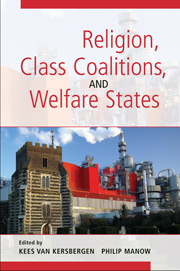Crossref Citations
This Book has been
cited by the following publications. This list is generated based on data provided by Crossref.
Kaspersen, Lars Bo
and
Lindvall, Johannes
2008.
Why No Religious Politics? The Secularization of Poor Relief and Primary Education in Denmark and Sweden.
European Journal of Sociology,
Vol. 49,
Issue. 1,
p.
119.
Vanhuysse, Pieter
2009.
Power, Order, and the Politics of Social Policy in Central and Eastern Europe.
SSRN Electronic Journal,
Galasso, Vincenzo
and
Profeta, Paola
2010.
When the State Mirrors the Family: The Design of Pension Systems.
SSRN Electronic Journal,
Kalyvas, Stathis N.
and
van Kersbergen, Kees
2010.
Christian Democracy.
Annual Review of Political Science,
Vol. 13,
Issue. 1,
p.
183.
Bolzonaro, Fabio
2010.
Book Review Essay: The uncertain destiny of an incomplete revolution.
Work, Employment and Society,
Vol. 24,
Issue. 3,
p.
591.
HÄUSERMANN, SILJA
2010.
Solidarity with whom? Why organised labour is losing ground in Continental pension politics.
European Journal of Political Research,
Vol. 49,
Issue. 2,
p.
223.
Beckert, Jens
2010.
The Transcending Power of Goods: Imaginative Value in the Economy.
SSRN Electronic Journal,
Gal, John
2010.
Is there an extended family of Mediterranean welfare states?.
Journal of European Social Policy,
Vol. 20,
Issue. 4,
p.
283.
Emmenegger, Patrick
2010.
Catholicism, Job Security Regulations and Female Employment: A Micro‐level Analysis of Esping‐Andersen's Social Catholicism Thesis.
Social Policy & Administration,
Vol. 44,
Issue. 1,
p.
20.
Tønnessen, Aud V.
2011.
Velferdsstaten og den lutherske toregimentslæren.
Norsk Teologisk Tidsskrift,
Vol. 112,
Issue. 3-4,
p.
196.
Lennartz, Christian
2011.
Power Structures and Privatization across Integrated Rental Markets: Exploring the Cleavage between Typologies of Welfare Regimes and Housing Systems.
Housing, Theory and Society,
Vol. 28,
Issue. 4,
p.
342.
Jo, Nam K.
2011.
Between the cultural foundations of welfare and welfare attitudes: The possibility of an in-between level conception of culture for the cultural analysis of welfare.
Journal of European Social Policy,
Vol. 21,
Issue. 1,
p.
5.
Warburton, Jeni
and
Jeppsson Grassman, Eva
2011.
Variations in older people's social and productive ageing activities across different social welfare regimes.
International Journal of Social Welfare,
Vol. 20,
Issue. 2,
p.
180.
Sorensen, Kerstin
2011.
Party Platforms and Public Childcare: Structural and Ideational Factors Shaping Policy in Norway and Sweden.
Scandinavian Political Studies,
Vol. 34,
Issue. 1,
p.
1.
EMMENEGGER, PATRICK
2011.
Job security regulations in Western democracies: A fuzzy set analysis.
European Journal of Political Research,
Vol. 50,
Issue. 3,
p.
336.
2012.
The Wiley‐Blackwell Companion to Political Sociology.
p.
491.
Zrinščak, Siniša
2012.
Book review: Welfare and Religion in 21st Century Europe: Volume 1. Configuring the Connections.
Critical Social Policy,
Vol. 32,
Issue. 2,
p.
282.
Traunmüller, Richard
2012.
Zur Messung von Staat-Kirche-Beziehungen: Eine vergleichende Analyse neuerer Indizes.
Zeitschrift für Vergleichende Politikwissenschaft,
Vol. 6,
Issue. S1,
p.
207.
Hiilamo, Heikki
2012.
Rethinking the role of church in a socio‐democratic welfare state.
International Journal of Sociology and Social Policy,
Vol. 32,
Issue. 7/8,
p.
401.
Grzymala-Busse, Anna
2012.
Why Comparative Politics Should Take Religion (More) Seriously.
Annual Review of Political Science,
Vol. 15,
Issue. 1,
p.
421.





